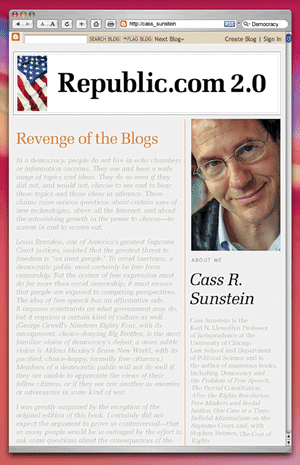 Republic.com 2.0 by Cass R. Sunstein (Princeton University Press) is reviewed by Jerome Weeks for the San Francisco Chronicle. Weeks begins:
Republic.com 2.0 by Cass R. Sunstein (Princeton University Press) is reviewed by Jerome Weeks for the San Francisco Chronicle. Weeks begins:Several years ago, the Online News Association posted on its site a proposed "bloggers' code of ethics." The voluntary guidelines were rather self-evident, well-meaning maxims suitable for framing: "Be honest and fair." "Minimize harm."
Many blogger journalists responded approvingly. But many others were incensed. Their denunciations could be summed up best by Eric Cartman, the funny, foulmouthed, unleashed id on "South Park": "You don't know me! I can do what I want!"
This simplistic libertarianism afflicts much of our thinking about the Web, Cass Sunstein argues in his updated book, "Republic.com 2.0." Even sophisticated thinkers, such as author Chris Anderson ("The Long Tail"), do not see beyond consumer self-interest as the Web's great, if not sole, purpose. It offers more goods to more people (often in areas where such goods weren't available). It permits more hobbyists to chat about collecting yurts, more people to watch videotaped Taserings. How can that be bad?
It isn't, Sunstein says, on the whole. It's terrific, really. (He says these things repeatedly; why will become clear.) But we're confusing the Web's individual license or, especially, its consumer bonanza with increased democracy. A University of Chicago Law School professor and a frequent author on rights, economics and constitutional law, Sunstein applies a simple-seeming but profound yardstick for measuring the Web's value: Is it good for democracy? And by democracy, Sunstein means not just wider markets for wind chimes but also the collective working out of our shared destiny as Americans.
Many blogger journalists responded approvingly. But many others were incensed. Their denunciations could be summed up best by Eric Cartman, the funny, foulmouthed, unleashed id on "South Park": "You don't know me! I can do what I want!"
This simplistic libertarianism afflicts much of our thinking about the Web, Cass Sunstein argues in his updated book, "Republic.com 2.0." Even sophisticated thinkers, such as author Chris Anderson ("The Long Tail"), do not see beyond consumer self-interest as the Web's great, if not sole, purpose. It offers more goods to more people (often in areas where such goods weren't available). It permits more hobbyists to chat about collecting yurts, more people to watch videotaped Taserings. How can that be bad?
It isn't, Sunstein says, on the whole. It's terrific, really. (He says these things repeatedly; why will become clear.) But we're confusing the Web's individual license or, especially, its consumer bonanza with increased democracy. A University of Chicago Law School professor and a frequent author on rights, economics and constitutional law, Sunstein applies a simple-seeming but profound yardstick for measuring the Web's value: Is it good for democracy? And by democracy, Sunstein means not just wider markets for wind chimes but also the collective working out of our shared destiny as Americans.
Continue reading here.